'Raincoat girl' delivers sunshine
The owner of a box-meal restaurant chain in Chengdu rushed to Wuhan along with a team of volunteers to cook food for healthcare workers during their fight against the outbreak, Li Yingxue reports.

Liu Xian is known as the "raincoat girl" among residents of Wuhan, Hubei province.
The 24-year-old got the nickname after Liu and the volunteer team she founded wore raincoats when cooking and delivering food and other donations because she says they gave all the protective suits to medical workers in the city.
Over 40 days from early February to March, they cooked over 20,000 meals and collected 3.5 million yuan ($494,000) worth of supplies.
People outside of Wuhan have also learned of Liu's contributions, since the United Nations Secretary-General's Envoy on Youth, Jayathma Wickramanayake, shared the stories of 10 young people, including Liu, fighting the outbreak in their communities around the world in her blog on April 3. She also called upon the youth to rise to the challenges posed by the pandemic.
"We need scientific breakthroughs, action by governments and a massive amount of financing, but we also need the kind of initiative and resourcefulness that motivates the world's outstanding young people," writes Wickramanayake.
"Their courage gives me confidence that young people can manifest the best in humanity-and that is a light that will shine for generations to come."
According to Wickramanayake, Liu has become a viral sensation in China and an inspiration to many around the world, young and old alike.
Liu says she felt honored that Wickramanayake mentioned her because she was simply doing what she felt she should.
Feeding recovery
Liu is a catering entrepreneur in Chengdu, Sichuan province, who founded her box-meal restaurant chain, Heyue, in 2017.
Heyue today has more than 100 branches across China, including one in Wuhan that opened last year.
On Feb 2, when Liu heard that healthcare workers in Wuhan were having difficulty getting hot meals, she immediately decided to go to the city to help and asked her employees if any of them would join her. Nine agreed.
They contacted the local authorities in Wuhan and managed to get special permission to travel to the city as volunteers.
The next day, Liu and her team hit the road, with more than 200 kilograms of pork, 300 kg of rice, two bags of potatoes and all the vegetables and condiments they had in their restaurants. Their two cars were so packed with food that there wasn't room for their personal luggage.
They drove for around 15 hours and arrived at their restaurant in Wuhan at midnight. The restaurant was fully equipped, but all employees had gone to their hometowns for Spring Festival and had not returned as the city was on lockdown.
After two hours of cleaning and disinfecting the kitchen, the team went to sleep at 3 am at a rented apartment nearby, she says. Four hours later, they started to prepare their first batch of 400 box meals for medics-stewed ribs with potatoes and rice.
Liu asked chefs to separate 1 kg of pork for only four portions of the meals to ensure they were nutritious.
They used the 200 kg of pork they'd brought within two days.
Liu ordered 500 kg more from Chengdu and started to find other ways to buy ingredients.
"We consumed around one 200-kg pig each day," she says.
Liu's team made some meals without the signature spiciness of Sichuan cuisine in case the healthcare workers in Wuhan weren't accustomed to it.
She says she couldn't stop crying on her way back from a hospital one day after medical workers said they enjoyed both flavors and showed great appreciation.
"The doctors also sneaked several boxes of milk into my car as a surprise gift," Liu recalls.
"They're so incredible. What we're doing is so little compared to them."
Liu decided she wouldn't leave until the pandemic was under control.
The meal service was intensive. The team started at 7 am and finished at midnight, after preparing ingredients for the next day.
Liu and four other employees, including 25-year-old chef Chen Guofu, remained in Wuhan until mid-March.
"Making each meal was like a fight," Chen says.
"We needed to make sure the meals would arrive at the hospital at 3:30 pm because medical workers starting their shifts at 4 pm wouldn't get another meal until eight hours later."
The community in which they stayed had 24 confirmed COVID-19 cases. So, Liu's volunteer group undertook even greater disinfection measures.
Chen says the most relaxing time daily was at night, when the team members gathered in the kitchen to prepare ingredients for the next day.
He was in charge of the meat while Liu peeled the potatoes.
"Liu was otherwise distributing food at the hospitals or on the road to and from the hospitals," he says.
"Only at night, all five of us were able to be together safely and chat. We're like family now."
Liu also used that time to livestream on Douyin, known as TikTok overseas, to appeal for donations for Wuhan.
Distributing them soon became part of her routine, in addition to providing meals.
Heyue's vice-general manager, Yang Sihai, began directing logistical support.
Every day, Yang would determine various hospitals' needs for hot meals and organize Liu's route for delivering the meals.
He also collected donation information, arranged shipments of donated supplies to Wuhan and organized for hospitals and volunteers to receive the goods, from personal protection equipment to juice and sausages.
"Even though I stayed in Chengdu to coordinate, I felt like I was in the same fight with Liu in Wuhan," Yang says.
He received not only donations from around the country but also help from an express company in Chengdu that offered free shipping for all goods sent to Wuhan.
Heading home
Liu didn't bring any extra clothes to Wuhan. The trousers she'd worn for a month faded because they were sprayed with disinfectant every day.
It snowed in February. Some locals brought Liu and her team warm coats. They also gave them cooking ingredients sometimes.
Liu realized it was time to leave when the local hospitals had all reopened their canteens and donations were no longer needed.
The team closed the restaurant on March 12 and left the city soon after.
As Wuhan lifted the lockdown on April 8 midnight, Liu and her team stayed up late in Chengdu to celebrate.
"When I saw all the cars leaving Wuhan at 12 am, I couldn't help crying. The past few months were too difficult," Liu says.
After her 14-day self-quarantine, Liu set up a small exhibition in her restaurant showcasing memorabilia she'd brought back from Wuhan, including her raincoat and the chipped kitchen knife they used.
Liu says she's continuing to do public service, including helping people from Hubei to find jobs after the pandemic and creating a facemask brand named Raincoat Girl.
"'Raincoat girl' is no longer my nickname but a symbol for a group of people-thousands of kindhearted people across China," she says.
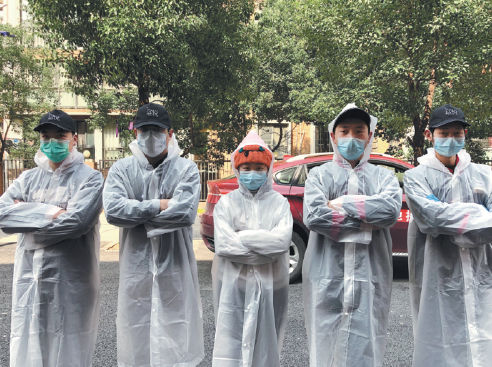
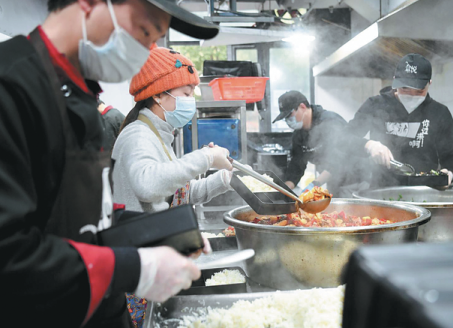
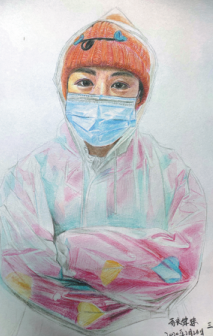
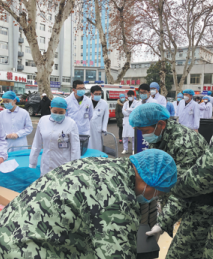
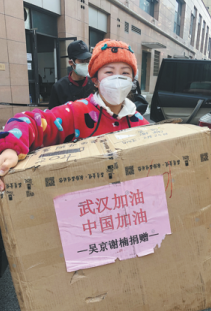
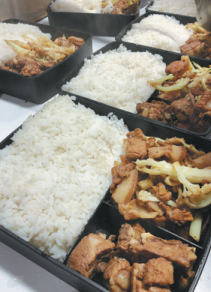
Today's Top News
- FM warns against Japan's challenge to post-war international order
- China to implement zero-tariff policy for 53 African countries
- Xi sends congratulatory message to 39th African Union Summit
- China upgrades Xiong'an high-tech zone to national level
- Xi extends Chinese New Year greetings to ring in Year of Horse
- Country sees strong rebound in FDI






























